A research team led by National Tsing Hua University Department of Physics and Center for Quantum Science and Technology professor Chuu Chih-sung (褚志崧) has developed Taiwan’s first and the world’s smallest quantum computer, using a single photon, the university said yesterday.
Chuu said in the study, which was published in the journal Physical Review Applied last month, that they had resolved the main obstacles for quantum computing development — high energy costs and a low-temperature operating environment.
Chuu said that photons are the smallest possible particle of electromagnetic energy, and his team had devised a way to encode information in 32time bins, or dimensions, of a single photon.

Photo: Hung Mei-hsiu, Taipei Times
Photons can be kept at a stable quantum state even at room temperature, he said.
Quantum computing is normally prone to information loss and calculation errors from vibrations or magnetic fields, he said.
However, photons have a more extended range of transmission, and they are less prone to interference, which contributes to a unique advantage when developing a commercialized quantum computer, he added.
Traditional computers enact computation on circuit boards, while quantum computing relays information through photonics and enacts computation using quantum physics.
The smallest unit of digital information in a traditional computer is the binary digit, or bit, which can only represent 0 or 1, Chuu said.
However, the quantum bit, or qubit, can be processed as both 0 and 1, a characteristic referred to as quantum superposition, he added.
Superposition enables quantum computing to process complex computations, such as prime factorizations or big data searches, up to 100 million times faster than traditional computers.
University president John Kao (高為元) said the paper’s publication in Physical Review Applied was an excellent milestone for quantum computing, as the device could operate at room temperature and was compact.
Kao said he remembered touring the US’ most advanced quantum computer lab last year.
He was struck by the enormity of the cooling system, which took up a whole room and kept temperatures at extremely low levels, Kao said.
Separately, the National Science and Technology Council has invited Alain Aspect, the 2022 Nobel Prize in Physics laureate, to attend this year’s Quantum Taiwan event, highlighting the nation’s focus on developing quantum technology.
The event would discuss quantum technology, superconducting quantum computers, quantum communications, quantum metrology, sensing and imaging.
National Science and Technology Council Minister Wu Cheng-wen (吳誠文) said quantum technology promises unforeseen computational abilities and could make communication safer.
The seminar is aimed at fostering international collaboration in creating a global platform to further develop quantum technology and ensure that Taiwan is an indispensable member of the global quantum technology development effort, Wu added.

TRUST: The KMT said it respected the US’ timing and considerations, and hoped it would continue to honor its commitments to helping Taiwan bolster its defenses and deterrence US President Donald Trump is delaying a multibillion-dollar arms sale to Taiwan to ensure his visit to Beijing is successful, a New York Times report said. The weapons sales package has stalled in the US Department of State, the report said, citing US officials it did not identify. The White House has told agencies not to push forward ahead of Trump’s meeting with Chinese President Xi Jinping (習近平), it said. The two last month held a phone call to discuss trade and geopolitical flashpoints ahead of the summit. Xi raised the Taiwan issue and urged the US to handle arms sales to

A magnitude 5.6 earthquake struck off the coast of Yilan County at 12:37pm today, with clear shaking felt across much of northern Taiwan. There were no immediate reports of damage. The epicenter of the quake was 16.9km east-southeast of Yilan County Hall offshore at a depth of 66.8km, Central Weather Administration (CWA) data showed. The maximum intensity registered at a 4 in Yilan County’s Nanao Township (南澳) on Taiwan’s seven-tier scale. Other parts of Yilan, as well as certain areas of Hualien County, Taipei, New Taipei City, Taoyuan, Hsinchu County, Taichung and Miaoli County, recorded intensities of 3. Residents of Yilan County and Taipei received

Taiwan has secured another breakthrough in fruit exports, with jujubes, dragon fruit and lychees approved for shipment to the EU, the Ministry of Agriculture said yesterday. The Animal and Plant Health Inspection Agency on Thursday received formal notification of the approval from the EU, the ministry said, adding that the decision was expected to expand Taiwanese fruit producers’ access to high-end European markets. Taiwan exported 126 tonnes of lychees last year, valued at US$1.48 million, with Japan accounting for 102 tonnes. Other export destinations included New Zealand, Hong Kong, the US and Australia, ministry data showed. Jujube exports totaled 103 tonnes, valued at

BIG SPENDERS: Foreign investors bought the most Taiwan equities since 2005, signaling confidence that an AI boom would continue to benefit chipmakers Taiwan Semiconductor Manufacturing Co’s (TSMC, 台積電) market capitalization swelled to US$2 trillion for the first time following a 4.25 percent rally in its American depositary receipts (ADR) overnight, putting the world’s biggest contract chipmaker sixth on the list of the world’s biggest companies by market capitalization, just behind Amazon.com Inc. The site CompaniesMarketcap.com ranked TSMC ahead of Saudi Aramco and Meta Platforms Inc. The Taiwanese company’s ADRs on Tuesday surged to US$385.75 on the New York Stock Exchange, as strong demand for artificial intelligence (AI) applications led to chip supply constraints and boost revenue growth to record-breaking levels. Each TSMC ADR represents